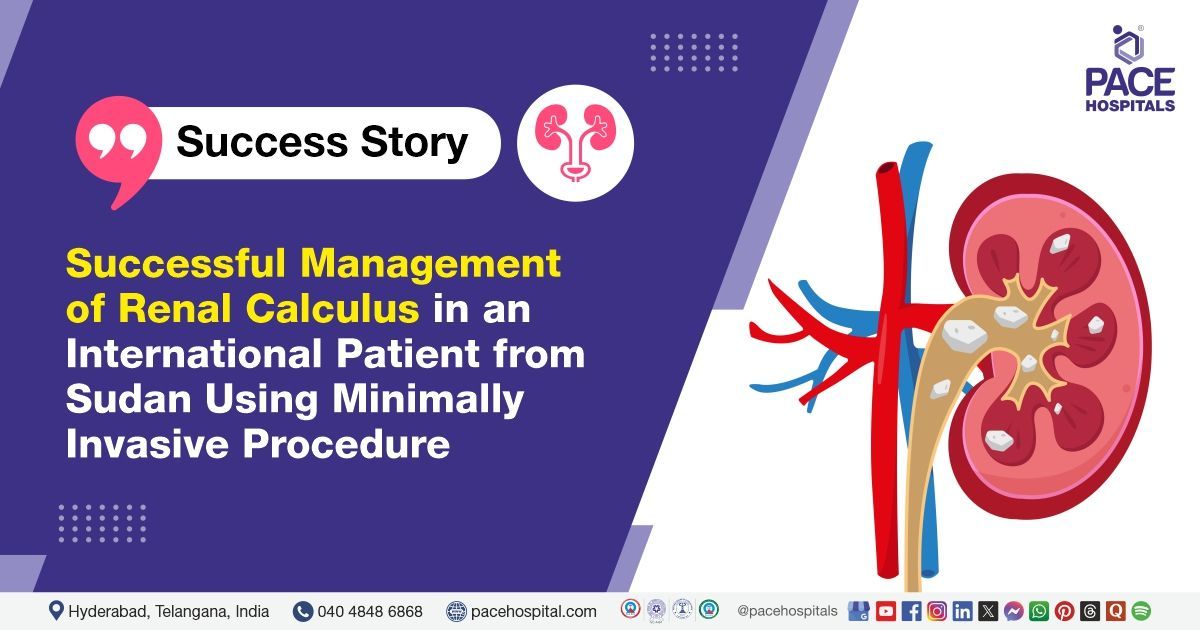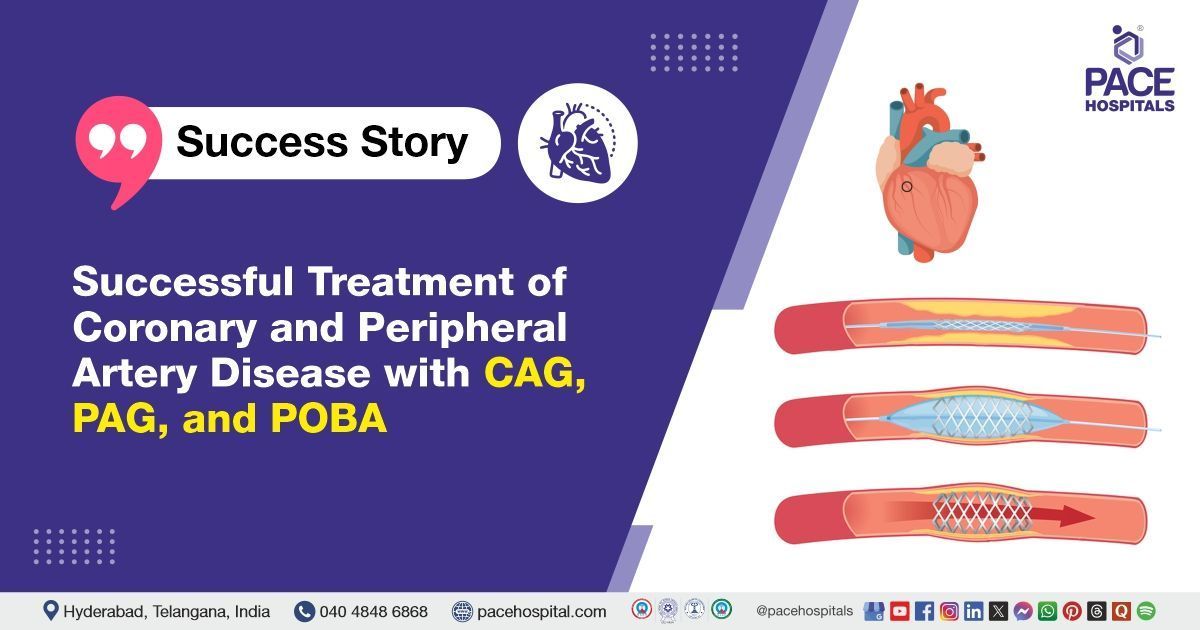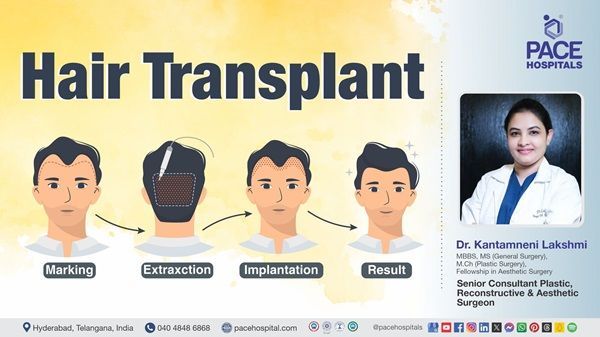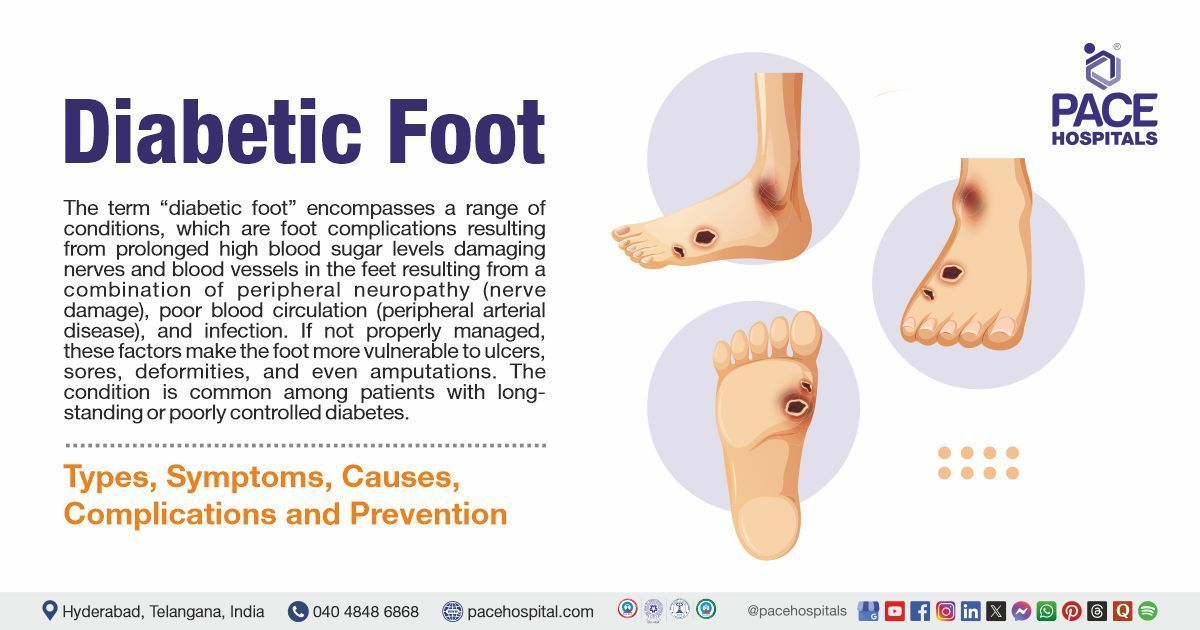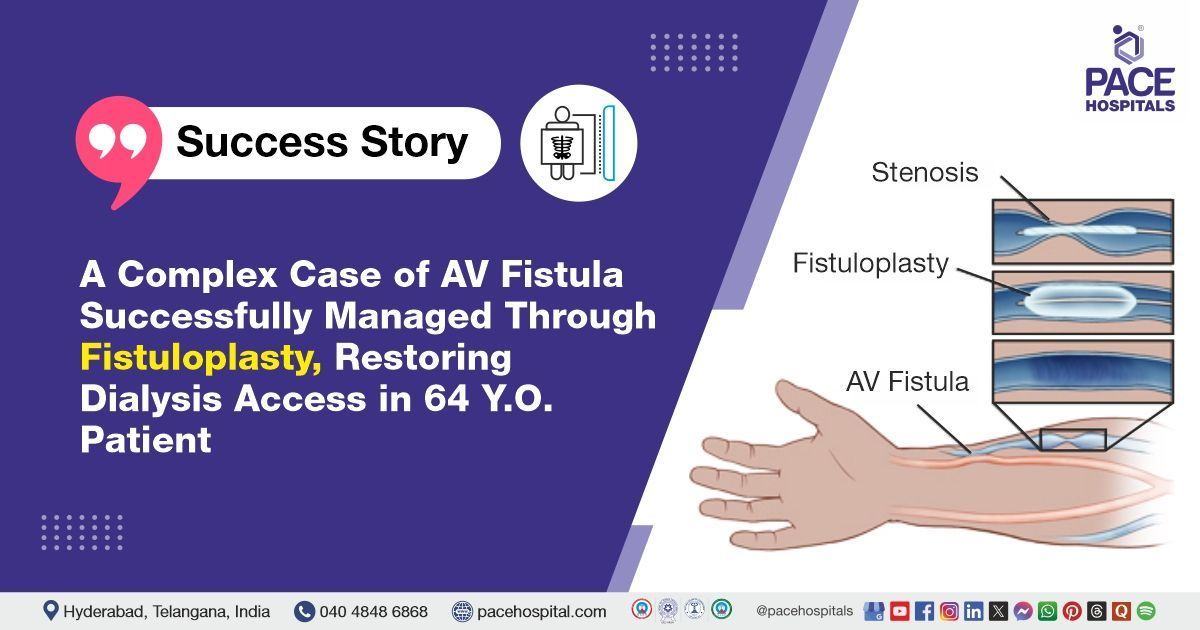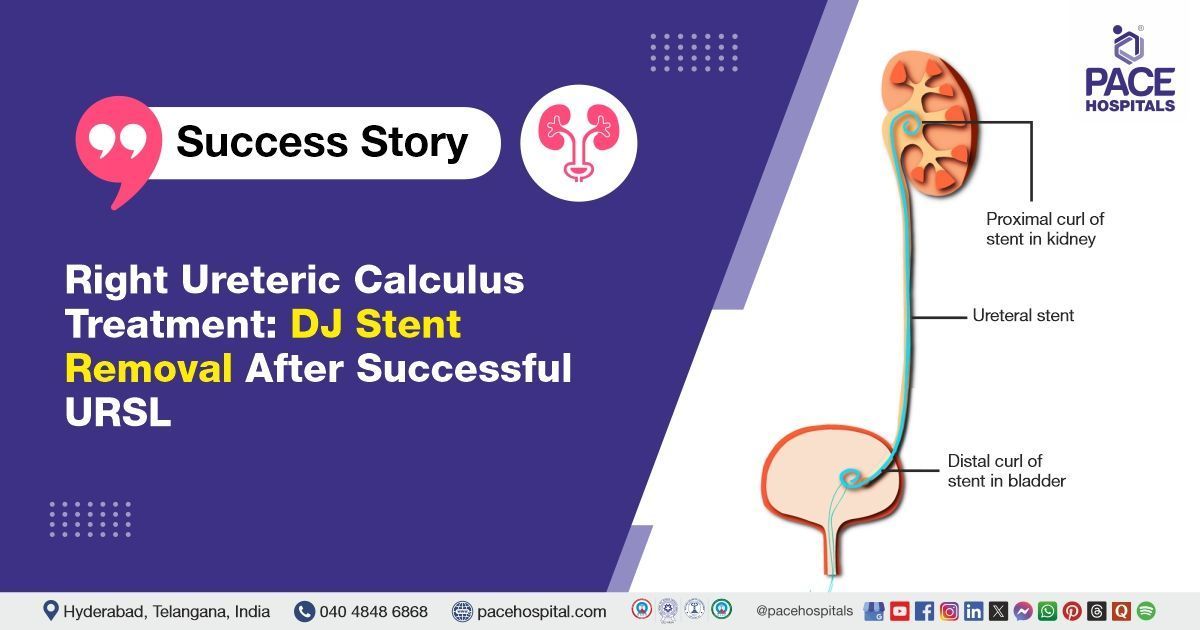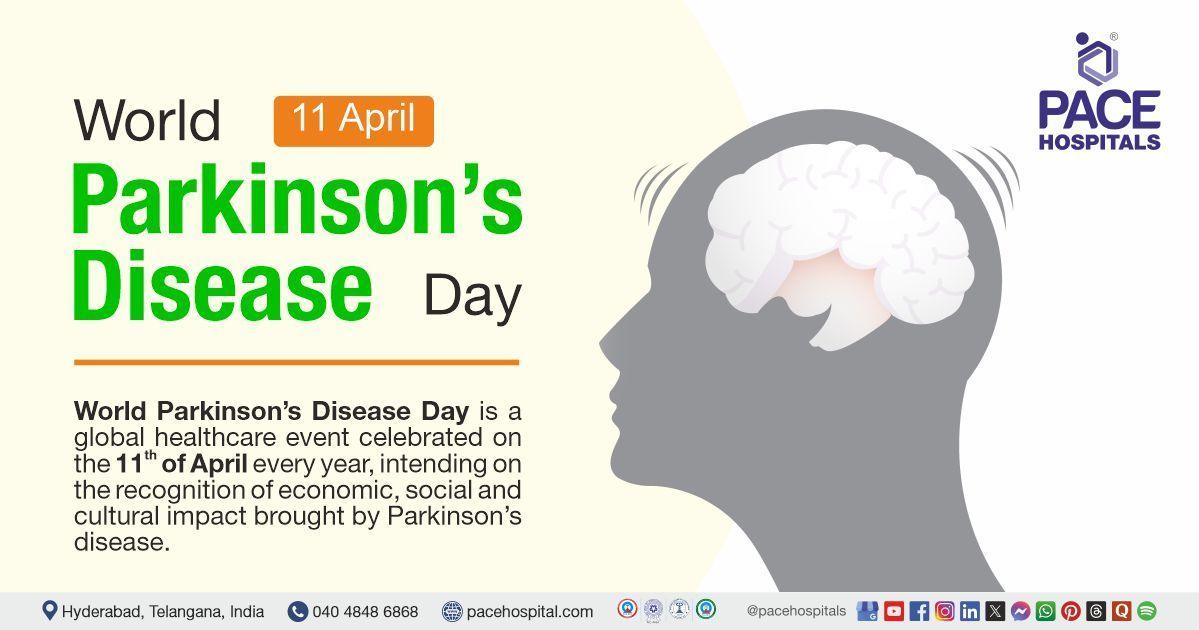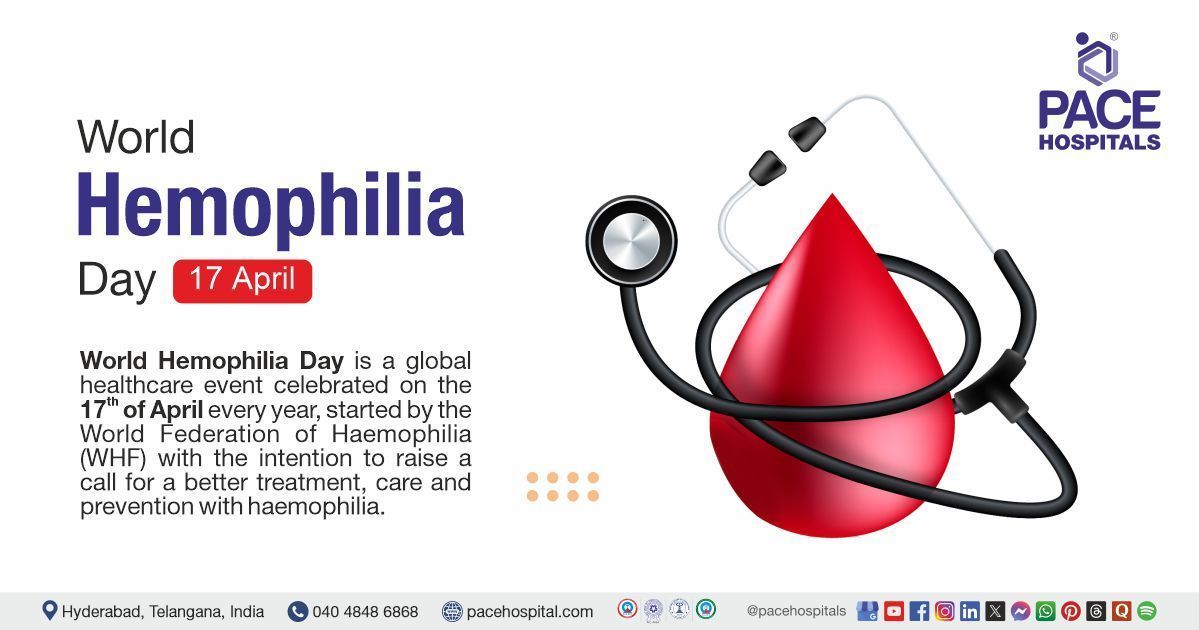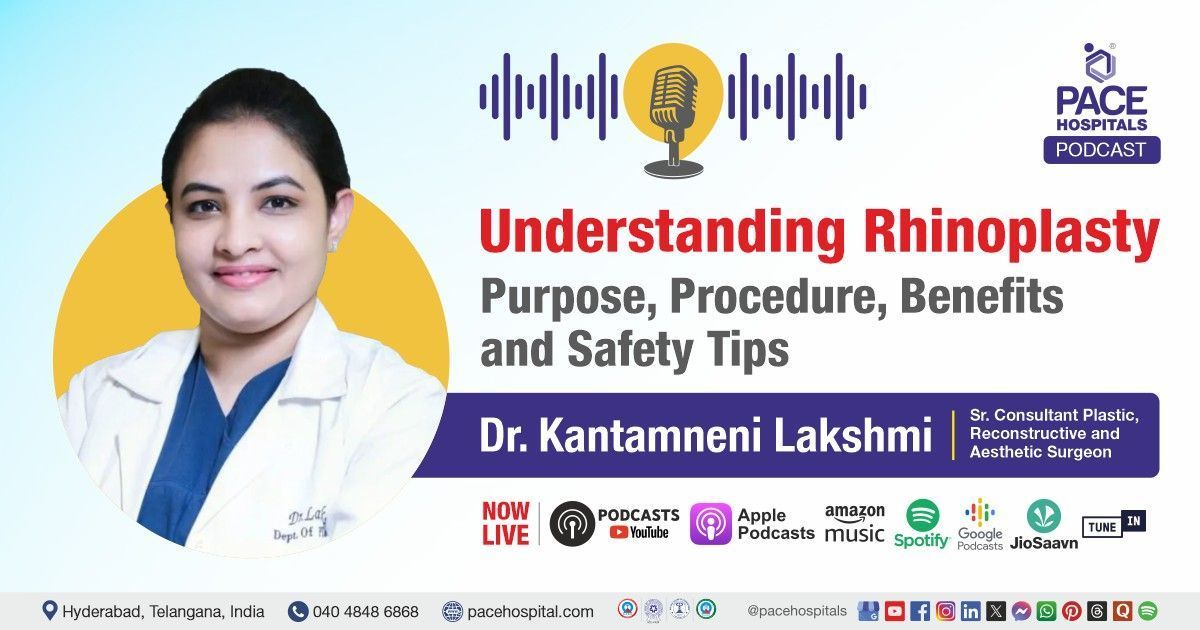Successful Management of Right Kidney Stone in an International Patient from Sudan using a Minimally Invasive Procedure
A 40-year-old male from Sudan presented with right flank pain and was diagnosed with a right renal calculus at the pelviureteric junction (PUJ), causing moderate hydronephrosis. He underwent
PCNL, URSL, and DJ stenting, achieving complete stone clearance and ensuring relief from symptoms and improved quality of life.
Chief complaints
A 40-year-old male from Sudan presented to
PACE Hospitals, Hyderabad, with complaints of right flank pain. The pain was the primary symptom that led to further evaluation and diagnosis.
Medical history and Diagnosis
The patient was diagnosed with a
right renal calculus (Kidney stones) located at the pelviureteric junction (PUJ), which was causing moderate
hydronephrosis. This condition was confirmed through diagnostic imaging, which revealed the obstruction and associated dilation of the renal pelvis.
Treatment Plan and Surgical Procedure
Upon confirmation of the diagnosis, Consultant Laparoscopic Urologist, Endourologist, Andrologist & Kidney Transplant Surgeon Dr. Abhik Debnath along with Dr. K Ravichandra recommended a minimally invasive approach to manage the condition, involving right percutaneous nephrolithotomy (PCNL), ureteroscopic lithotripsy (URSL), and the placement of a double-J (DJ) stent.
During the surgery, a midpole posterior calyceal puncture was made on the right kidney, and the tract was dilated to 21 French (Fr). Using an 18 Fr nephroscope, the stone was fragmented and completely cleared.
Intraoperatively, mild mucosal edema was noted at the site of stone impaction. General anesthesia was used for the procedure, and the patient tolerated it well without any complications.
Postoperative Course
The patient's intraoperative and postoperative recovery was successful. He experienced no significant complications and was stable at the time of discharge.
Expected postoperative symptoms, such as mild flank or suprapubic discomfort, occasional blood or cloudiness in urine, and mild burning sensation during urination, were explained to the patient, along with reassurance that these symptoms would typically resolve within 7–10 days.
Diet Notes
Postoperative dietary advice was aimed at preventing the recurrence of renal calculi and promoting overall recovery.
The patient was instructed to maintain adequate hydration by drinking plenty of fluids. He was encouraged to include citrus fruits such as lemon and orange juices in his diet to alkalinize the urine and reduce stone formation.
A low-purine and low-salt diet was recommended to minimize uric acid production and calcium excretion in the urine, which are common contributors to stone formation.
Discharge Medications
The discharge medications included antibiotics to prevent infections, antipyretics to manage fever, proton pump inhibitors (PPIs) to prevent gastric irritation, alpha blockers to relax smooth muscles and aid urinary flow, and a urine alkalizer to maintain optimal urinary pH. These medications were aimed at facilitating recovery and preventing complications.
Discharge Instructions
The patient was advised to avoid lifting heavy weights, forward bending, and prolonged travel on buses, autos, or two-wheelers. Straining during bowel movements was also discouraged to minimize pressure on the surgical site.
He was informed that passage of stone fragments in the urine was normal, and mild symptoms like occasional blood in the urine, cloudy urine, or discomfort were expected as part of the healing process. However, he was instructed to report immediately to the emergency department in case of fever, severe abdominal pain, or vomiting, as these could indicate complications.
Review Notes
The patient was advised to return for a follow-up visit after two months for DJ stent removal. This is a crucial step in the post-treatment plan to prevent stent-related complications, such as infections or encrustation.
Impact of PCNL with URSL and DJ stenting in complete elimination of renal calculi
This case demonstrates the successful management of a symptomatic right renal calculus with moderate hydronephrosis using minimally invasive techniques. The combination of PCNL, URSL, and DJ stenting provided complete stone clearance with minimal complications, ensuring symptom relief and improved quality of life for the patient. Postoperative care, including dietary modifications and activity restrictions, was emphasized to support recovery and prevent recurrence. The case highlights the importance of timely diagnosis, a well-executed surgical approach, and comprehensive patient education in achieving optimal outcomes in the management of complex urological conditions.
Request an appointment
Fill in the appointment form or call us instantly to book a confirmed appointment with our super specialist at 04048486868
Appointment request - health articles
Thank you for contacting us. We will get back to you as soon as possible. Kindly save these contact details in your contacts to receive calls and messages:-
Appointment Desk: 04048486868
Whatsapp: 8977889778
Regards,
Pace Hospitals
Hitech City and Madinaguda
Hyderabad, Telangana, India.
Oops, there was an error sending your message. Please try again later. We will get back to you as soon as possible. Kindly save these contact details in your contacts to receive calls and messages:-
Appointment Desk: 04048486868
Whatsapp: 8977889778
Regards,
Pace Hospitals
Hitech City and Madinaguda
Hyderabad, Telangana, India.
Our Locations – Find the Best Hospital Near You
Metro Pillar Number C1772, Beside Avasa Hotel, Hitech City Road, Near HITEC City Metro Station, Hyderabad, Telangana, India.
Mythri Nagar, Beside South India Shopping Mall, Hafeezpet, Madeenaguda, Hyderabad, Telangana, India.
040 4848 6868
Payment in advance for treatment at PACE Hospitals, Hyderabad, Telangana, India (Pay in INR ₹)
For Bank Transfer:-
- Bank Name: HDFC
Company Name: Pace Hospitals
A/c No.50200028705218
IFSC Code: HDFC0000545 - Bank Name: STATE BANK OF INDIA
Company Name: Pace Hospitals
A/c No.62206858997
IFSC Code: SBIN0020299
Scan QR Code by Any Payment App (GPay, Paytm, Phonepe, BHIM, Bank Apps, Amazon, Airtel, Truecaller, Idea, Whatsapp etc).

CONTACT US
Call: +914048486868
WhatsApp: +918977889778
Email: info@pacehospitals.in
FOLLOW US
SUBSCRIBE
Subscribe to our newsletter and stay updated with the latest health information.
Subscribe to PACE Hospitals' Public Newsletter
Thank you for subscribing to PACE Hospitals' Newsletter. Stay updated with the latest health information.
Oops, there was an error. Please try again submitting your details.
ABOUT US
QUICK LINKS
Disclaimer
General information on healthcare issues is made available by PACE Hospitals through this website (www.pacehospital.com), as well as its other websites and branded social media pages. The text, videos, illustrations, photographs, quoted information, and other materials found on these websites (here by collectively referred to as "Content") are offered for informational purposes only and is neither exhaustive nor complete. Prior to forming a decision in regard to your health, consult your doctor or any another healthcare professional. PACE Hospitals does not have an obligation to update or modify the "Content" or to explain or resolve any inconsistencies therein.
The "Content" from the website of PACE Hospitals or from its branded social media pages might include any adult explicit "Content" which is deemed exclusively medical or health-related and not otherwise. Publishing material or making references to specific sources, such as to any particular therapies, goods, drugs, practises, doctors, nurses, other healthcare professionals, diagnoses or procedures is done purely for informational purposes and does not reflect any endorsement by PACE Hospitals – your trusted hospital near me.

